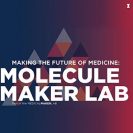About Us
The Burke group aims to advance the frontiers of pharmacology towards molecular prosthetics, i.e., functional small molecules that serve as substitutes for missing or dysfunctional proteins that underlie currently incurable human diseases.
Featured Collaboration
Rajeev Chorgade (pictured above) was very fortunate to get a chance to collaborate with Emily’s Entourage, an organization dedicated to discovering therapies for the 10% of people who cannot benefit from treatment with CFTR modulators. This collaboration allowed us to interact with leading researchers in the field, and we are working together to determine whether the molecular prosthetics approach can provide benefit to people with cystic fibrosis.
Featured Collaboration
The first-of-its-kind Molecule Maker Lab (MML), part of the Medical Maker Lab at Illinois, will empower physician-innovators at the Carle Illinois College of Medicine, and citizen scientists from around the world, to create molecules on-demand. This powerful new concept could do for health innovation what 3-D printing did for engineering: bring innovative solutions to anyone anywhere. It could enable rapid new drug development and other technologies that rely on small molecules. Current projects in the MML feature new conductive and electrochemically active small molecule and polymer materials.
Our story
The Burke research group is pioneering the development of “molecular prosthetics”—small molecules that mimic the functions of deficient proteins that underlie a wide range of human diseases. The group has also created an automatable lego-like platform for synthesis that is broadly enabling and expanding access to the molecule-making process. The Burke group has harnessed this platform to advance molecular prosthetics for treating cystic fibrosis into clinical trials and to enable preclinical testing of molecular prosthetics for anemia and a new class of nontoxic fungicidal agents.
Marty Burke also helped launch the Carle Illinois College of Medicine as the inaugural associate dean for research, created the molecule making machine and leads the effort to develop the Molecule Maker Lab. Marty utilizes his on-demand molecule-making machine to develop molecular prosthetics, small molecules that replace missing proteins and restore function in cells. These prosthetics may treat diseases such as anemias, cystic fibrosis or certain types of heart disease.

Website made by ATLAS interns

